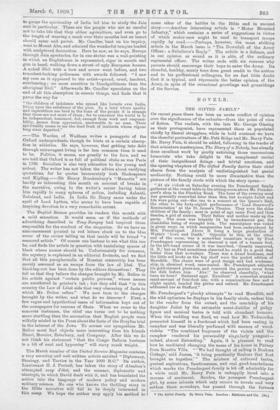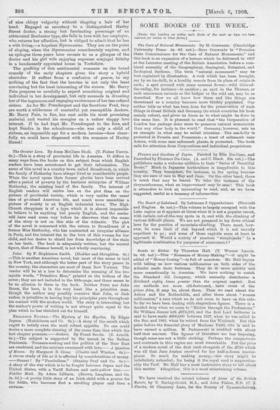NOVELS.
THE GIFTED FAMILY.* Or recent years there has been an acute conflict of opinion • over the significance of the suburbs—from the point of view of fiction. The realists, with the late Mr. George Caning as their protagonist, have represented them as populated chiefly by dismal strugglers, while in bold contrast we have the cheerful portraiture of Mr. Pett Ridge and Mr. Barry Pain.
Mr. Barry Pain, it should be added, following in the tracks of that miniature masterpiece, The Diary of a Nobody, has already done excellent work by gently satirising those unconscious humorists who take delight in the complacent recital of their insignificant doings . and trivial emotions, and the opening chapters of The Gifted Family derive their chief charm from the analysis of undistinguished but genial mediocrity. Nothing could be more illuminative than the picture of the family circle with which the story opens:—
" At six o'clock on Saturday evening the Prendergast family gathered at the round table in the sitting-room above Mr. Prender- gast's shop in the Finchloy Road. The hour of the evening meal was generally somewhat later than this, but to-night Juliet and Ida were going out—the one to a concert at the Queen's hall, the other to the forty-eighth performance of Lord Stanwood's Renunciation' at the St. James's Theatre. They were the elder children of the family ; next in point of age came Fred and then Sandra, a girl of sixteen. Their father and mother made up the party. The room was brightly lit by incandescent gas, the chandelier being of wrought iron. The mantelpiece was veiled in green serge on which marguerites had been embroidered by Mrs. Prendergast. Above it hung a largo production of Watts's Love and Death.' Opposite to this, at the other end of the room, was a somewhat immature work by Fred Prendergast representing in charcoal a cast of a human foot. In the left-hand corner of it was inscribed, Greatly improved, G. B.,' but as Fred sometimes observed he could do a good deal better than that nowadays. There was a dwarf bookcase, and the little rod books on the top shelf were the pocket edition of Meredith. The chairs were of good design and bad workman- ship, in ebonised wood, cane-seated. Mr. Prendergast adjusted his gold-rimmed pince-nez, and removed the pewter cover from the dish before him. 'Ala!' lie observed cheerfully, 'what have we here ? Buttered eggs. Excellent.' A somewhat stunted maid-servant of four-foot ono, with a conscientious face and a slight squint, handed the plates and retired. Mr. Prendergast addressed her as Stafford."
Mr. Prendergast's "plucky attempts" to road Meredith, and the wild optimism be displays in his family circle, endear him to the reader from the outset, and the courtship of his daughter Juliet by the estimable scent-distiller of podgy figure and musical tastes is told with abundant humour.
When the wedding was fixed, we read bow Mr. Todmorden presented himself in a frockcoat which had been resting in camphor and was liberally perfumed with essence of wood- violets. " The combined fragrance of the violets and the camphor rendered his personality singularly pungent—
indeed, almost distracting." Again, it is pleasant to read how he meditated changing the name of his house in Putney from Rosetta Villa. " ' We had thought of calling it Brahma Cottage,' said James, it being practically Brahma that first brought us together.' " The mixture of cultured tastes, genteel aspirations, facetiousness, and real good-heartedness which marks the Prendergast family is hit off admirably for a while until Mr. Barry Pain is unhappily lured into a
morass of sentiment. Sandra, the youngest Prendergast girl, by some miracle which only occurs in novels and very
seldom there nowadays, has passed through the furnace
• Th. Gifta Family. By Barry Pain. London I Methuen and Co. [ea.]
of nice chirpy vulgarity without singeing a hair of her head. Engaged as secretary to a distinguished Harley Street doctor, a strong but fascinating personage of an attenuated Rochester type, she falls in love with her employer, who returns her affection, but is obliged to admit that he has a wife living,—a hopeless dipsomaniac. They are on the point of eloping, when the dipsomaniac considerately expires, and an epilogue three years later reveals to us a glimpse of the doctor and his girl wife enjoying supreme conjugal felicity in a handsomely appointed house in Yorkshire.
The grafting of this sentimental romance on the broad comedy of the early chapters gives the story a hybrid character. It suffers from a confusion of genres, to say nothing of the fact that the heroine is not only the least convincing but the least interesting of the sisters. Mr. Barry Pain prepares us carefully to expect something original and individual in her development, but only succeeds in divesting her of the ingenuous and engaging exuberance of her less refined sisters. As for Mr. Prendergast and the facetious Fred, they are worth a wilderness of masterful yet susceptible doctors. Mr. Barry Pain, in fine, has oast aside his most promising material and wasted his energies on a rather sloppy love interest. If he had kept Mr. Prendergast to the fore, and kept Sandra in the schoolroom—she was only a child of sixteen, an impossible age for a modern heroine—how cheer- fully we could have dispensed with the romance of Harley Street!















































 Previous page
Previous page